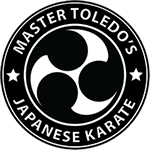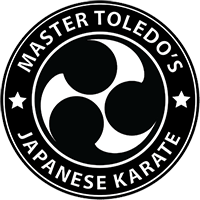Dojo Rules
- Always arrive early to class. Your instructor’s time and the time and your fellow students are valuable, and it should not be wasted.
- Always train with a positive, open attitude toward learning karate.
- Always give maximum effort in your training. Never slack off or be lazy just because you think the instructor is not watching.
- Apply yourself to every portion of your training, kata, kumite, Judo, ippon work and especially character development.
- Always set an example for others to follow, inside and outside of the training hall.
- Train with your fellow students with a positive and helpful attitude.
- No horseplay or fooling around while training. Because we all must train responsibly and not “play” with our karate.
- Loud, Profane and abusive language are strictly prohibited.
- No personal equipment is to be Left overnight in the Dojo.
- No food, drink or gum is allowed on the training floor. The training floor is a place to train in karate and should be kept neat and clean. Remember training in karate is a privilege and your Hanshi / Sensei (instructor) is there to help you develop not only as a martial artist but also as a person.
- Listen attentively to your instructor and follow his or her instructions.
- Only use the physical aspects of karate outside the training hall when all other options have failed. The karate techniques you learn are dangerous and can seriously hurt people. Always keep this in mind (retreat until you cannot, retreat any further! This is our prime directive)
- Show care and concern for the well-being of your training companions.
- As you progress in rank help those below you.
- Do not attempt to teach friends and acquaintances outside the Dojo or show off your skills to
anyone.
Personal Hygiene and Attire
- Always wear a clean gi (uniform). A clean and pressed gi represents a positive and fresh attitude toward your karate training.
- Never wash your obi (belt). It will carry the sweat and hard work with you every time you train.
- Training equipment is to be kept clean, (Gear, shin pads things of that nature).
- Male students should wear a cup and supporter while training.
- Female students should wear a sports bra and or tee shirt under their gi top at all times. Other protective gear for protecting the chest area can be purchased.
- Finger and toenails should be neatly trimmed short so as not to scratch or accidentally cut your fellow students.
- No jewelry is allowed on the training floor while training. Rings can injure fellow student and damage equipment. Earrings and necklaces can easily be damaged during training.
- Glasses should be secured with a sports band or removed while training.
- Your obi (belt) should only be worn while training in the dojo. The belt is a personal item and is not for display as a trophy. Keep it in your bag or around your neck until you put it on for training. It is not to be thrown on the floor for any reason.
Bowing
- Bow to fellow karateka before starting any partner work. The bow is a sign of respect and common understanding. It should not be skipped or lessened. Your bow is a direct representation of your attitude toward your karate training and should be taken seriously. Perform all necessary ceremonies (bows) (Osu) as necessary.
- Bow when you enter and leave the training floor. The training floor is also a special place to you. It is where you will sweat, hurt, laugh, grow and learn.
- Bow to any instructor that is working with you or before asking him/her a question. Bowing is a way of saying, “excuse me” and showing appreciation for the instructor’s help.
- Bow whenever and to whomever you feel like you need to. It is always a good thing and demonstrates your attitude toward training and humility.
Kumite/Sparring
- All appropriate equipment is required while sparring. Students will need protective gear, a mouthpiece and cup and supporter (males).
- Always bow to your fellow students before starting any kumite exercise. Remember you are assuring your kumite partner that you are sharing a common goal of personal improvement.
- Always train with the proper attitude. There is no place for ego during training. This is often difficult for students that are just learning to spar.
- Never practice kumite without an instructor present or without permission.
- Do not attempt techniques on a partner that you have not been taught by an instructor. Sometimes students may see techniques performed by advanced students that appear simple on the surface but have complex less obvious movements. Remember your partner is not a “practice dummy” but a person that has volunteered to help you learn. Remember the movies are not training films and actors are not instructors.
- It is not appropriate to ask a senior belt to spar. Senior belts may be training on different material or directed by the instructor to focus on certain aspects. It is however, okay to ask an instructor for help on sparring techniques.
Katas
- Students should not practice katas they have not formally been taught by an instructor. Katas are the way a Sensei passes down his style of karate to his students.
- Students should study hard and focus on the katas that they have been taught. Katas have subtle movements, and every kata has several layers to be learned.
Competitions and Demonstrations
- No impromptu demonstrations of karate, outside the dojo, will be allowed without the instructor’s permission. Your karate training and skills is the concern of you and your instructor. Often times demonstrating your karate to others, outside the dojo makes you appear to be “showing off” or bragging about your abilities. From time to time, demonstrations will be organized through the dojo, and you may be asked to participate in those events. If you have a group of people, i.e. church groups, coworkers, etc… that are interested in karate training then please let an instructor know and maybe a demonstration would be appropriate and could easily be arranged.
- Students should not register or compete in any martial arts tournament without the permission of the instructor. Any time a student competes or displays his karate skills, he is representing his instructor and his dojo. The instructor has a vested interest in where he and his training hall are represented and who represents him. Often the Instructor will know more about the tournament than the student and may have chosen not to be represented there. Students are encouraged to discuss their competition goals with an instructor. Remember competing in tournaments is a privilege and not an inherent part of your karate training.
- A student should always demonstrate the utmost sportsmanship. It is important to be a “good winner” and a “good loser”. Even the best competitors sometimes lose and when they do, people will be watching them to see how they behave. Tournaments are often a testing ground for not only physical skills but personal development as well. Competition can test a student’s humility, self-control, courage, integrity and courtesy. It is important that the student represent his school, his Sensei and his training as well.
Rank Examinations
- Once a student has been asked to test, it is up to the student to insure he/she knows all the requirements listed for the belt exam. The instructor may ask a student to test based on several factors, such as his/her spirit, time in training, daily training effort or special circumstances not understood or known to the student.
- It is the student’s responsibility to make sure he/she knows the requirements listed. If the student does not know a technique listed on the requirements, contact the instructor and he will arrange for it to be taught or he may waive that requirement for the exam.
- It would be inappropriate for a student to tell the Sensei they are not ready or ready to test. The student should learn to trust his/her instructor’s decision and realize that Hanshi may be pushing the student to better himself or herself. The student should, however, discuss their concerns or fears about testing with the instructor so that they may feel better about the decision.
Dismissal from Training
- A student may be dismissed from training for any act that brings his school, his instructor or himself into disgrace. The student must remember that as a martial artist he/she has the responsibility to set an example for others to follow. His/her behavior, even outside the training hall is a representation of his karate training and of his/her instructor.
- A student may be dismissed for not attempting to develop as a martial artist. Some students want to only train in the physical aspects of karate and are not interested in developing the strong character traits that are emphasized by the instructors. Those students do not understand the study of karate and are encouraged to training in a more sport-oriented environment.
- A student may be dismissed for not attempting to train with your fellow students with a positive and helpful attitude or disrespect of any kind.
If you have any questions, please contact Hanshi Louis Toledo before or after Class or by cell phone (914) 213-9676 or email him at [email protected].

